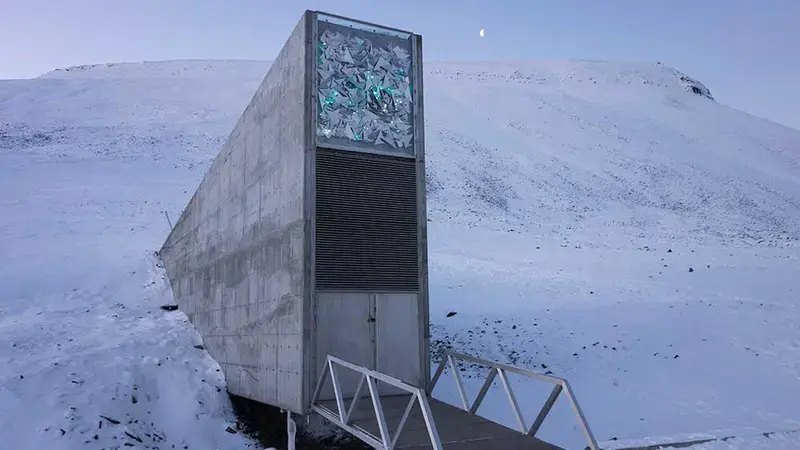Protecting ICARDA’s unique seed collection

Last week ICARDA deposited accessions from its 2016 seed harvest into the Svalbard Global Seed Vault for long-term safe-keeping – ensuring that these unique genetic materials will continue to play a critical role in the development of climate-resilient crops for generations to come.
A total of 7511 accessions of wheat, barley, faba bean, chick pea and grass pea were deposited in the vault, a secure facility located 1,300 kilometers south of the North Pole in Norway, which is used to preserve duplicate samples of seeds. It currently holds more than 880,000 samples from 73 Gene Banks around the world – collections that contain seeds from almost every country in the world.
The move follows an earlier deposit of 15,420 seed samples in February, and is part of ICARDA’s on-going efforts to protect its globally-important collection of landraces and wild relatives – a crucial mission in light of the security situtaion in Aleppo where the Center’s main Gene Bank remains active yet inaccessible.
ICARDA’s seed collection contains some 153,000 samples of major winter cereals, food legumes, forage and rangeland species drawn from the ‘Fertile Crescent’ in Western Asia, the Abyssinian highlands in Ethiopia, and the Nile Valley, where earliest known crop domestication practices were first recorded. Many plants are now extinct in their natural habitats.
This unique genetic material is currently located in genebanks in Terbol, Lebanon and at ICARDA’s research station in Morocco, and is safely duplicated at several levels: in the partner genebanks of international CGIAR research centers, CIMMYT and ICRISAT, the Swiss and Indian national genebanks, and the Svalbard Seed Vault in Norway.
Re-establishing active collections in Morocco and Lebanon
In addition to the seed deposit, the Center also withdrew 52451 seed samples which will help re-establish active collections in Morocco and Lebanon and enable ICARDA to answer requests for germplasm coming from agricultural organizations and farmers around the world. The Center’s Gene Bank distributes up to 25,000 samples each year to collaborators and requestors – providing the building blocks of new climate-resilient crop varieties.
The withdrawal last week follows a similar move in 2015 when ICARDA became the first organization in history to withdraw seed from Svalbard.
Speaking in Svalbard where he helped identify seed samples for withdrawal, Dr. Ali Shehadeh, Rangeland and Pasture germplasm Curator at ICARDA, commented: “The deposit, withdrawal, and transport of the seeds may require a lot of resources and hard work. However, compared to the value of these seeds for future food supplies and global food security, the costs are small.”
A global partnership for seed security
The shipments from Svalbard to Morocco and Lebanon have been funded by the Global Crop Diversity Trust (Crop Trust), which is also a partner in the operation of the Seed Vault with the Government of Norway and NordGen. The Crop Trust is working to establish, fund and manage a global system for the conservation of crop diversity.
ICARDA is one of the 11 international genebanks that is part of this international system and over the coming few years the Center plans to withdraw all its deposited seeds, produce new seeds, and bring new samples back to Svalbard for safe storage.
